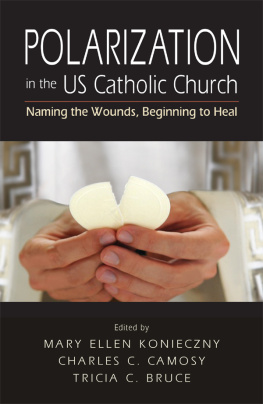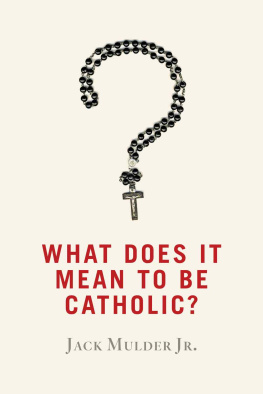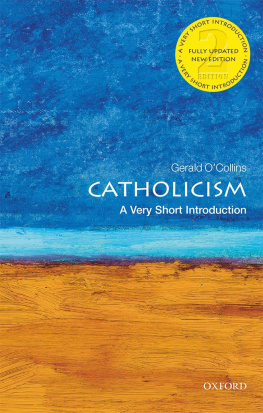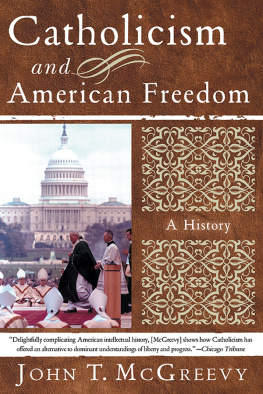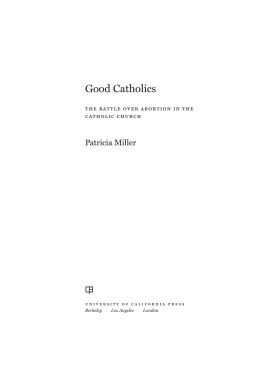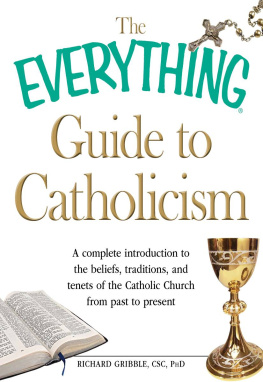Polarization is one of the gravest illnesses infecting the US Catholic Church. In fact, Catholics often have an easier time talking with members of other Christian denominations and other religious traditions than with one another. Before we can accomplish anything in our church, we must first be able to talk to one another charitably. This book is an important step forward, as some of the church's most thoughtful men and women lay out the scope of the problem, consider its roots, and point to healthy and life-giving ways to move ahead. Essential reading for Catholics in the United States.
James Martin, SJ
Author of Jesus: A Pilgrimage
The volume is a rich collection of essays that offer a diversity of voices on the reality of polarization in the Catholic Church, a polarization that reflects the reality of the broader American reality. The essays offer wisdom drawn from personal experiences of polarization brought to bear on the expertise of religious leaders, academics, and advocates. I encourage anyone interested not only in understanding the phenomenon of polarization in the Church but also in finding insights into strategies to address it to pick up this book. The honest assessments of the wounds in our Church and society are coupled with genuine hope for healing grounded in the various authors experiences of working toward creating the space for genuine dialogue. This volume is a gift to those of us who long to help create such spaces. It was truly a pleasure to read this work. I intend to bring different essays into my various classes, work with students, and conversations with colleagues.
Catherine Punsalan-Manlimos, PhD
Malcolm and Mari Stamper Endowed Chair in Catholic
Intellectual and Cultural Traditions
Director, Institute for Catholic Thought and Culture
Associate Professor, Theology and Religious Studies Seattle University
Pope Francis reminds us that open and fraternal debate makes theological and pastoral thought grow. We should welcome such debate as evidence of a vibrant Church engaging issues at the heart of our faith. Polarization in the US Catholic Church advances this effort, challenging Catholics to remember that ours is a Church of relationship rooted in love and that our discourse must reflect that if were to advance our evangelizing mission.
Kim Daniels
Former spokesperson for the president of the
US Conference of Catholic Bishops
Cover design by Monica Bokinskie.
2016 by Order of Saint Benedict, Collegeville, Minnesota. All rights reserved. No part of this book may be reproduced in any form, by print, microfilm, microfiche, mechanical recording, photocopying, translation, or by any other means, known or yet unknown, for any purpose except brief quotations in reviews, without the previous written permission of Liturgical Press, Saint Johns Abbey, PO Box 7500, Collegeville, Minnesota 56321-7500. Printed in the United States of America.
The Library of Congress has cataloged the printed edition as follows:
Library of Congress Cataloging-in-Publication Data
Names: Konieczny, Mary Ellen, editor.
Title: Polarization in the US Catholic Church : naming the wounds, beginning to heal / edited by Mary Ellen Konieczny, Charlie C. Camosy, and Tricia C. Bruce.
Description: Collegeville, Minnesota : Liturgical Press, 2016. | Includes bibliographical references.
Identifiers: LCCN 2016007173 (print) | LCCN 2016023779 (ebook) | ISBN 9780814646656 (pbk.) | ISBN 9780814646908 (ebook)
Subjects: LCSH: Catholic ChurchUnited States. | Conflict managementReligious aspectsCatholic Church.
Classification: LCC BX1406.3 .P65 2016 (print) | LCC BX1406.3 (ebook) | DDC 282/.7309051dc23
LC record available at https://lccn.loc.gov/2016007173
Contents
Acknowledgments
This book comes directly from a conference of the same title held at the University of Notre Dame in April 2015. We want to begin by expressing our gratitude to the following sponsors.
The Our Sunday Visitor Institute and the Louisville Institute deserve special thanks. Both organizations not only helped to fund the conference but also supported the authors contributing to this book. We are grateful also to the following conference sponsors: The Henkels Lecture Fund, Notre Dame Institute for Scholarship in the Liberal Arts; the Notre Dame Center for Ethics and Culture; the Notre Dame Center for Social Concerns; the Notre Dame Center for the Study of Religion and Society; the Department of Sociology at the University of Notre Dame; the Notre Dame Cushwa Center for the Study of American Catholicism; and Fordham Universitys Center on Religion and Culture.
We must offer a special note of thanks to Michael McGillicuddy, whose insistence that Mary Ellen and Charlie have a meeting set in motion a series of events that led to the publishing of this book. Another debt of special thanks is due to Katie Camosy, Charlies sister, who filmed and directed the production of a video from the conferenceat a deep discount.
Thanks are definitely due Liturgical Press, which worked overtime to make sure this book came out on deadline. Hans Christoffersen and his staff kept us on track, happily, in the most painless ways possible. Charlie and Mary Ellen would like to single out our coeditor Tricia Bruce as well; without her efforts, this book would simply not have gone to press on time.
Finally, we are extremely grateful for the participation of Bishop Daniel Flores (Brownsville), Bishop Michael Mulvey (Corpus Christi), and Rev. John I. Jenkins, CSC, president of the University of Notre Dame. Thanks also to each of the delegates to the Notre Dame conference who were not formal contributors to this book; be assured that your interventions have helped to shape the following pages in profound ways.
Introduction
Polarization in the US Catholic Church
Mary Ellen Konieczny
I am a casualty of two culture war skirmishesone in the 60s, the other in the 80sand I have the scars to prove it. These scars have dogged me over the years. I have never shed the resentments I formed when my deepest beliefs and convictions were disparaged... and I have rarely felt safe enough to reengage on contested issues.
Michael McGillicuddy, address to Polarization in the US Catholic Church conference, April 29, 2015
Universalitythat is, small c catholicityand, therefore, unity amid diversity are fundamental to Roman Catholicism. But in recent years, divisions around issues that are by now all too familiarperhaps most notably, issues of gender, sexuality, and authorityhave rent the Catholic Church in the United States. Divisions over these issues, of course, are not unique to Catholics. We live in a larger society in which divisiveness and vitriol are evident in many of the local churches of religious traditions practiced in the United States. These divisions are often produced in tandem with our public politics and, perhaps, paradigmatically reflected in them. And although conflict is not only sociologically necessary but also often a healthy part of societal interaction, these conflicts appear to be unproductive and intractable.
As a result, rather than the healthy debates characteristic of a living tradition, we have witnessedin our churches, in our public politics, and in the local context of our everyday lives an absence of genuine engagement and dialogue. Catholics of good will often feel alienated from one another. As described in the epigraph above, this alienation is not the product of a mere disagreement but of disrespect and dismissal of others. It wounds people. Cardinal Sean OMalley has described the current climate of polarization as a cancer in the Church. This is a disturbingly apt metaphor applied to the church as the Body of Christ. Moreover, it is no surprise that the issues provoking these debates are often described as neuralgic, since they are not only long-standing and painful but also difficult to address much less heal.

